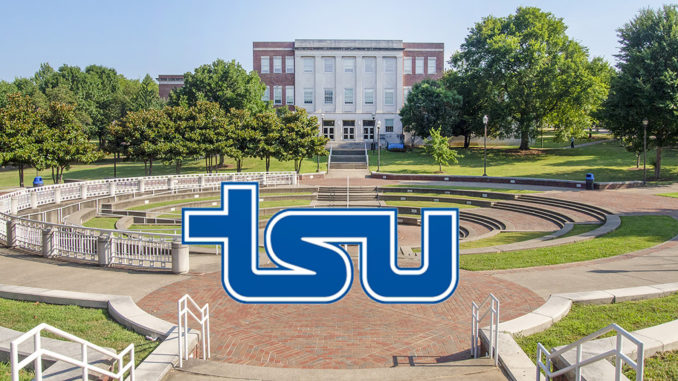get these nets
Veteran
How TSU Connected With Apple and Became a Global Coding Hub for HBCUs
Feb 24, 2021

NASHVILLE, TN (TSU News Service) -— Tennessee State University President Glenda Glover had a vision of bringing coding and creativity experiences to all the nation’s historically black colleges and universities and their communities. About two years ago, she, along with a team of community and administrative leaders, traveled to California to discuss the idea with Apple. The tech giant liked it.
“We shared our vision and our mission of empowering all the HBCUs with the digital literacy skills of coding,” says Dr. Glover. “We saw where the world was changing, which meant the workplace was changing, and a need for us to change the way we prepare HBCU students so they can be more competitive in the workforce.”
In July 2019, TSU launched the inaugural HBCU C2 Presidential Academy through its newly established Global SMART Technology Innovation Center. More than a dozen HBCUs were involved, and Apple provided equipment, professional development and training.
Apple CEO Tim Cook tweeted about the initiative: “Anything is possible when people come together with a shared vision. Thank you to @TSUedu for your leadership and enthusiasm in bringing coding to your community and HBCUs nationwide!”
That vision has continued to grow. Under TSU’s Global SMART Technology Innovation Center, there are now eight regional hubs, and community coding centers at 26 HBCUs. At least 20 HBCUs are on a waiting list.
“I can document that right now we have impacted 14,000-plus HBCU students and 5,000-plus community people (including faculty, staff, students and the community),” says Dr. Robbie Melton, associate vice president of TSU’s Center.
Dr. S. Keith Hargrove is dean of the College of Engineering at TSU and a coding trainer.
“We are well on our way to impacting and expanding our HBCU reach to more institutions and communities, to promote the value of coding and using creativity tools for software development,” says Hargrove. “And we can’t wait to see the amazing things they will do with these new skills.”
Statistics show 67 percent of tech companies are made up of less than 5 percent of black employees. In Tennessee, information technology employment grew by nearly 3,800 net new jobs in 2019.
At TSU, the university is giving its alumni and others affected by the coronavirus pandemic an opportunity to retool. In a continued partnership with Apple, it’s helping those individuals learn how to code and design apps through an “Everyone Can Code and Create” course offered online.
======================================
DID IT LIKE THAT, AND NOW DO IT LIKE THIS
===========================================
Tennessee State University offers coding classes in Africa
May 27, 2021
Tennessee State University announced on Wednesday that it will begin offering an online app design and coding class in two African countries this fall.
Robbie Melton, who runs TSU's coding program, said the idea is to get African students interested in STEM careers and increase the number of Black students entering those fields. App design and coding is an easy introduction.
Bishop E. Earl McCloud, Jr., of the 14th Episcopal District of the AME Church, reached out to TSU for this partnership. McCloud presides over the partnering institutions in Africa: African Methodist Episcopal University and Monrovia College, both in Monrovia, Liberia, and Wilberforce Community College in Evaton, South Africa. Wilberforce teaches high school and college students.
TSU already offers the app coding program to more than 30 historically Black colleges and universities in the United States, and more than 2,000 students have participated since it started in 2019, Melton said. Around 20% have gone on to pursue STEM degrees, she said.
In addition to teaching students, TSU faculty members train participating school faculty to be able to give the courses themselves. The same will be true for the African schools, which have signed up 500 students to take the course over the next three years. That includes both college students and high school students who will take advantage of dual-enrollment.
If some of the students decide to continue their studies with TSU, the school is now able to offer degrees remotely through virtual classes, TSU President Glenda Glover said.
"Our global mission is to empower underserved populations," Glover said. "Access to education is challenging in parts of Africa. We're meeting that challenge and breaking those barriers
Feb 24, 2021

NASHVILLE, TN (TSU News Service) -— Tennessee State University President Glenda Glover had a vision of bringing coding and creativity experiences to all the nation’s historically black colleges and universities and their communities. About two years ago, she, along with a team of community and administrative leaders, traveled to California to discuss the idea with Apple. The tech giant liked it.
“We shared our vision and our mission of empowering all the HBCUs with the digital literacy skills of coding,” says Dr. Glover. “We saw where the world was changing, which meant the workplace was changing, and a need for us to change the way we prepare HBCU students so they can be more competitive in the workforce.”
In July 2019, TSU launched the inaugural HBCU C2 Presidential Academy through its newly established Global SMART Technology Innovation Center. More than a dozen HBCUs were involved, and Apple provided equipment, professional development and training.
Apple CEO Tim Cook tweeted about the initiative: “Anything is possible when people come together with a shared vision. Thank you to @TSUedu for your leadership and enthusiasm in bringing coding to your community and HBCUs nationwide!”
That vision has continued to grow. Under TSU’s Global SMART Technology Innovation Center, there are now eight regional hubs, and community coding centers at 26 HBCUs. At least 20 HBCUs are on a waiting list.
“I can document that right now we have impacted 14,000-plus HBCU students and 5,000-plus community people (including faculty, staff, students and the community),” says Dr. Robbie Melton, associate vice president of TSU’s Center.
Dr. S. Keith Hargrove is dean of the College of Engineering at TSU and a coding trainer.
“We are well on our way to impacting and expanding our HBCU reach to more institutions and communities, to promote the value of coding and using creativity tools for software development,” says Hargrove. “And we can’t wait to see the amazing things they will do with these new skills.”
Statistics show 67 percent of tech companies are made up of less than 5 percent of black employees. In Tennessee, information technology employment grew by nearly 3,800 net new jobs in 2019.
At TSU, the university is giving its alumni and others affected by the coronavirus pandemic an opportunity to retool. In a continued partnership with Apple, it’s helping those individuals learn how to code and design apps through an “Everyone Can Code and Create” course offered online.
======================================
DID IT LIKE THAT, AND NOW DO IT LIKE THIS
===========================================
Tennessee State University offers coding classes in Africa
May 27, 2021
Tennessee State University announced on Wednesday that it will begin offering an online app design and coding class in two African countries this fall.
Robbie Melton, who runs TSU's coding program, said the idea is to get African students interested in STEM careers and increase the number of Black students entering those fields. App design and coding is an easy introduction.
Bishop E. Earl McCloud, Jr., of the 14th Episcopal District of the AME Church, reached out to TSU for this partnership. McCloud presides over the partnering institutions in Africa: African Methodist Episcopal University and Monrovia College, both in Monrovia, Liberia, and Wilberforce Community College in Evaton, South Africa. Wilberforce teaches high school and college students.
TSU already offers the app coding program to more than 30 historically Black colleges and universities in the United States, and more than 2,000 students have participated since it started in 2019, Melton said. Around 20% have gone on to pursue STEM degrees, she said.
In addition to teaching students, TSU faculty members train participating school faculty to be able to give the courses themselves. The same will be true for the African schools, which have signed up 500 students to take the course over the next three years. That includes both college students and high school students who will take advantage of dual-enrollment.
If some of the students decide to continue their studies with TSU, the school is now able to offer degrees remotely through virtual classes, TSU President Glenda Glover said.
"Our global mission is to empower underserved populations," Glover said. "Access to education is challenging in parts of Africa. We're meeting that challenge and breaking those barriers
Last edited:

